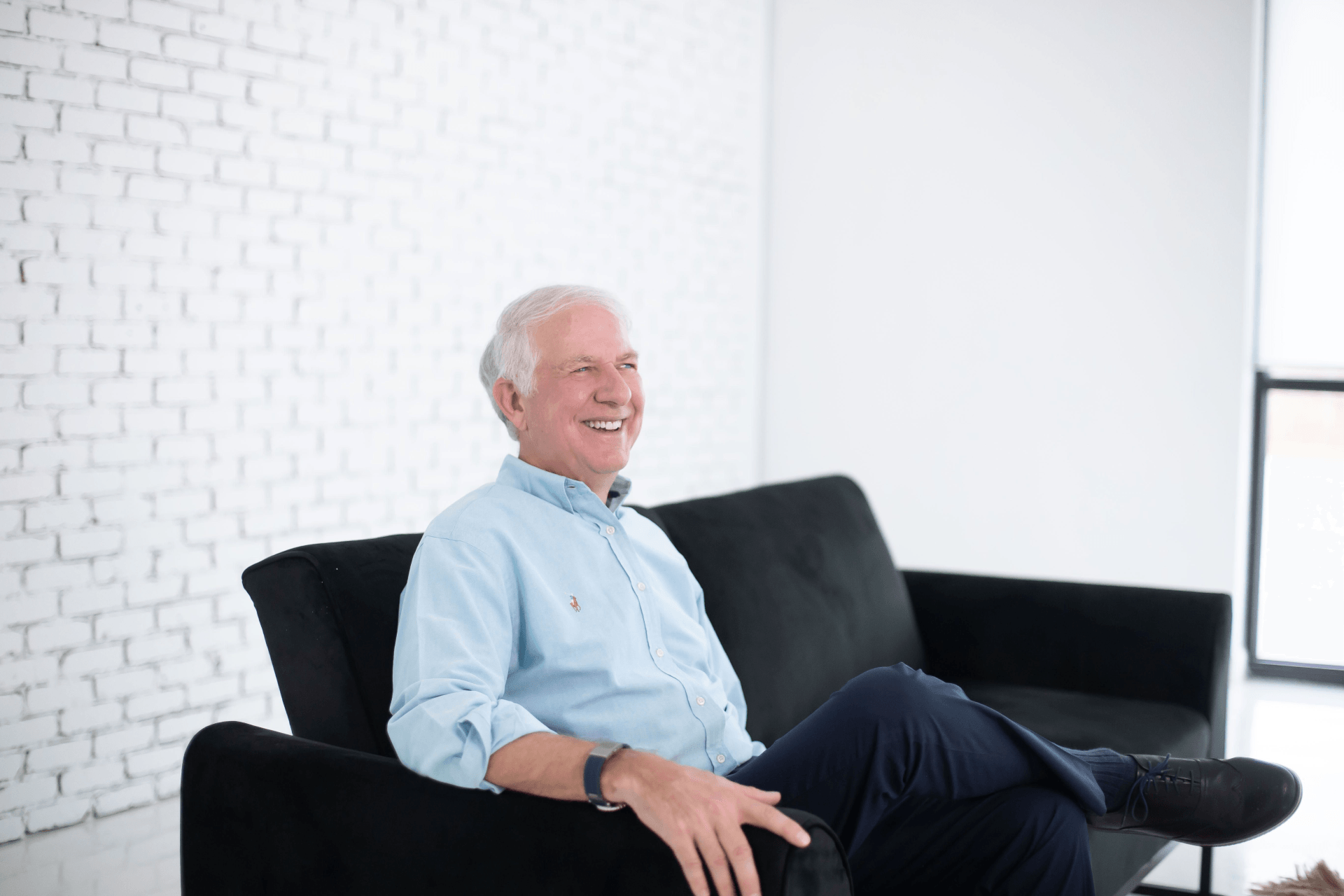✔️ Thank you! Check your email for your free ebook.
Interesting in Investing?

Buy and hold investing is a deeply entrenched mindset that most of today’s investors and investment managers have by default. It’s so widespread as a concept, that not many people are looking at it critically or asking if it still is working in today’s markets–or if another strategy would work better. But this almost universally believed mantra of “you can’t time the market” doesn’t make a lot of sense anymore because of how investing tools have shifted. The thing is, you can take your long-term investments to cash during most volatile times in the market to avoid losing money unnecessarily. And to do this you need to be able to identify market multi-year cycles (or work with someone who can do this for you). We offer such a service with our program AMPT - Assisted Managed Portfolios by TRADEway . Where the Buy and Hold Strategy Originated Buying and holding through the market’s worst days can be devastating for your portfolio. So why does almost everyone do this? The “buy and hold” recommendation was made famous by John Bogle in his book The Little Book of Common Sense Investing , which was published in 2007. In it, Bogle argued that the fees that mutual fund managers charge rule out the extra returns they get from actively buying and selling in the market. He showed you would profit more, and avoid lots of drama, by simply buying and holding index funds like the S&P and others. But does this argument still hold up? Where Bogle Got Buy and Hold Wrong Bogle made the assumption that most people aren’t going to bother to learn the skills required to get in and out of the market effectively. And he’s right, most people won’t want to bother learning how to do that. It takes a solid stock market education to time getting in and out of the market consistently. And making a mistake with regards to timing the stock market can really cost you. But with the right training, tools, and expertise, timing larger market cycles is actually very doable. In our program AMPT , our Investment Advisor Representatives carefully monitor the market for breaks in market trends. And with our expertise (and the nimbleness that comes with not being in a mutual fund) we can get you out of the market more quickly, saving you from losing money unnecessarily. We also have an option within AMPT where you can request to have our investment advisory representatives do shorter-term trades using a portion of your money (we recommend no more than 20%). This can lead to a boost in your account that you can then turn around and re-invest. Maybe the idea of trusting someone else to get your money out of the market and knowing when to put it back in makes you nervous. That’s understandable, given how much buying and holding is preached in our society. Our long-term investing team are all registered investment advisors representatives. Our current roster manning the AMPT division include beloved stock trading Coaches Geoffrey Nance , Jenny Taylor , Jared Russell , and Ben Russell , and they are all well-versed in the market’s multi-year cycles.

Well, isn’t that a good question! How much do you need to comfortably retire? This is a question for which people have been trying to come up with a simple answer for decades. Many think the answer is one million dollars. Others say more. Unfortunately, there is no easy answer. There is no exact figure one can come up with to “know” they will be able to comfortably retire. The reason for this is that there are so many unknown variables in the future. The biggest unknown variable is that we simply do not know how long we will live. According to the CDC, the average life expectancy for a male in the United States is 73 years, while the average life expectancy for a female is 79 years. However, if you are healthy, it is not difficult to live well into your 80s or even later. One could narrow it down by looking at family history, but you would still not be able to come up with an exact age. There are plenty of other unknowns as well, for example, which future laws will change regarding finances. Will taxes increase and if so, how much? Will Social Security still be around when you retire? Other things which need to be considered are what you plan to do in retirement. Do you plan to travel? Will your retired life look simple and modest or will you want to splurge and enjoy some of the finer things in life you did not have time to enjoy when you were working? And then again there are the unknowns about future life circumstances. What will your medical bills be as you grow older? What curveballs will life throw at you that will end up being costly? As you can see there simply is no possible way to determine an exact figure of what your expenses will be in retirement. Therefore, I think we need to shift our focus and start asking some different questions. First, I think we need to take a close look at retirement… The traditional form of retirement of working until you are 65, quitting your job, and discontinuing being productive is actually a fairly new concept, and not a good one either. Many studies have shown that this harsh transition from working full time to lounging full time actually decreases your life expectancy dramatically. I would also argue this is not what God wants you to do with the last years of your life. All throughout the Bible you can read stories of people following God’s will into their old age and they are always working on the mission God has given them. Obviously, this mission changes as their life progresses. The work they would complete in their old age would be appropriate taking into consideration the limitations that come with aging. They would not quit work and sit around using their time only for self-interests. Even though we may “retire” and leave our career, we should continue the work God has given us to do. There is much work outside of our job or career that God calls us to do. For some of us that might be teaching Sunday School, or serving in a homeless shelter, or coordinating missions teams for overseas trips. For some it may simply be helping to take care of the grandkids or mentoring younger folks through their life challenges. My wife’s grandmother is still alive at the age of 101 and she is still faithfully fulfilling the task that God has currently laid on her heart. She is a prayer warrior who fervently intercedes in prayer on behalf of all her kids, grandkids, and great grandkids. She is old and frail but she continues to be used by God in mighty ways on a daily basis. Now, the fact that we continue to work and serve God in the new ways He has laid out for us does not mean we cannot take advantage of some of the extra discretionary time available in retirement. Maybe you have always wanted to do some traveling. I personally love to travel and see as much of God’s beautiful creation as I possibly can. Perhaps, your hobby is carpentry and in retirement you would like to devote more time to this hobby and maybe even use it to bless God’s children. Maybe you love gardening and experience great enjoyment in caring for your plants which God has also created. Your answer could also be a combination of several of these potentials and more. We are all uniquely created. Retirement will look different for everyone and will probably change as we grow older. The question we should be asking ourselves in retirement is ”How does God want to use me?” In fact, this is the question we should all be asking whether we are retired or not. You may even find that God doesn’t want you to stay at your job grinding it out until you are 65. Maybe He has different plans for you which will take you on a more fruitful path before you hit “retirement age.” The question posed in this article is “How much do you need to comfortably retire?” We have now discussed a bit what “retire” could mean and what it shouldn’t mean. Let’s discuss the word “comfortably.” This really is the operative word in the question. How do we define what comfortable retirement is? We could talk about what kind of house you will live in, how much traveling you will do, what kind of cars you will drive, etc. I would argue that we need to look to God for this answer. If we closely examine God’s Word and seek God’s mission for us in retirement we will quickly see that God doesn’t as much call us to a comfortable retirement as He is calling us to a fruitful retirement. So, the real question should be “How do we continue to be fruitful in retirement?” The answer to this of course will vary person to person based on their giftings, resources, health, personalities, and more. Our mission at TRADEway is to help Christian families have more resources to use to further God’s Kingdom. As you know we teach trading in the stock market. One of the beautiful things about this type of business is that you can easily continue trading when you retire. Just because you leave your job or your career does not mean you need to quit trading too. Having developed trading skills has the potential to substantially reduce the amount of money needed to retire. You simply need a smaller lump sum of money if you continue to bring in an income. Imagine how incredible it would be if your funds did not dwindle or decrease in retirement but instead continued to increase as you got older! This is one of our missions at TRADEway. TRADEway’s AMPT Program aims to help ease the burden of managing your long-term retirement funds. Too many financial advisors are content with leaving your money in the market with a buy and hold mindset. “Hopefully” there will be enough to comfortably retire whenever you hit retirement age. In the AMPT Program we are not seeking to be merely content. We are also not banking on hope. We look to actively manage funds, using the knowledge and skills of a trader, and the wisdom God has given us to position you to carry out the purpose God has for you now and in retirement. Now, I hope you have realized by now that I am not trying to avoid the initial question, but instead give you a framework of questions you need to ask yourself and prayers you need to ask God so you can make a wise and informed projection for your finances. You will need to estimate at what age you might leave your employment. You will need to consider how long you might live. You will need to have an idea of what life will look like for you when you are retired and roughly what your expenses would be. Will you have any income at all to help counter the expenses? Again, more questions which will take some contemplation and prayer. As you can see, the question posed at the beginning is really a myriad of questions. Everyone’s answer will be different. Once you have wrestled and prayed through all of these questions you will better be able to answer the first question. How much do YOU need to comfortably retire? To learn more about TRADEway’s long-term investment program–AMPT–book a call with one of our incredible reps here . –David Verbruggen Speaker, Consultant, Director of Charts & Coach

Find the perfect fit for your long-term investing, with this biblically-based investment portfolio model! Based on asset classes found in scripture and adhering to the investment wisdom found in Ecclesiastes, TRADEway has developed a truly unique portfolio model to help you take control of your long-term investments. With multiple options based on your personal risk profile, age, etc we are able to tailor fit this powerful model to best fit your needs. With additional educational courses and a truly assistive service, you can either take full control or let TRADEway do the long-term investing for you. Remember, trading and investing are two very different skill sets and everyone should find an appropriate mix of both. But you don't have to do it alone! Book a call with our AMPT Team today at https://www.tradeway.com/ampt !

With so many different types of retirement accounts, how do you know which one is right for you? It may be easier than you think to decide what the best option is. Employee Sponsored Retirement Accounts First of all, if you work for an employer that provides retirement benefits in an employee sponsored retirement account, then the decision has already been made for you. Depending on where you work, such as a for-profit company, a non-profit company, or the government, you may have a 401K, 403B or Thrift Savings Plan (TSP). Often these employers will match your contributions up to a certain percentage, say 3-5%. But what about those that are either self-employed or work for a company that doesn’t have retirement benefits? Traditional IRAs and Roth IRAs The two main types of self-directed retirement accounts are the Traditional Individual Retirement Account (Trad IRA) and the Roth Individual Retirement Account (Roth IRA). The main difference between these two is WHEN you pay taxes on the money contributed and distributed/withdrawn. Money contributed to a Traditional IRA is considered pre-tax and would count as a deduction on your earned income for that tax year. This means that when you take distributions (remove the money), you will pay taxes upon distribution. In other words, the money invested is tax deferred until you take distributions. The Roth IRA is different because you pay taxes on the income that is contributed to the account. The money contributed and any gains are tax-free in retirement. For a great comparison chart see this article at Investopedia. There are income limits with the Roth IRA, which adjusts most years, you can review that in the article listed as well. Generally speaking, both types of retirement accounts have maximum contribution limits for 2022 of $6,000; or $7,000, if age 50 or older. For 2023 these limits are increasing to $6,500; or $7,500, if age 50 or older. If you have both types of accounts the combined total contributed between the two must not exceed the overall IRA contribution limit for that tax year. An example of this would be that someone under 50 could contribute $3,000 to a Trad IRA and another $3,000 to a Roth for the tax year 2022 for a total of $6,000 max between the two types of accounts. How Would You Decide Between a Traditional IRA and a Roth IRA? You should consider asking yourself this important question: Will I pay more in my taxes on my earnings now than when I retire? You may have more tax credits or deductions now compared to when you are retired and taking distributions from your Trad IRA, so you may end up paying more in taxes once retired, especially if you are still working and also have to start taking distributions. Whereas, if you contribute to a Roth IRA now, you will pay taxes on those earnings now and be able to withdraw them tax free upon retirement. We recommend speaking with a Tax Attorney or CPA to discuss eligibility for retirement accounts because if you also work for an employer that provides retirement benefits, there are limits on how much you can contribute to self-directed IRAs. They could also possibly discuss what your tax situation would look like upon retirement to help you decide which type of self-directed account best suits your personal financial needs. Either way you go though, saving for retirement is important, so start saving as early in your life as you can and if you haven’t started yet, there is no time like the present! Get an IRA account opened and start contributing, even just $50 a month if you can! Be consistent! At TRADEway, we’re here to help with your short-term trading or long-term investment needs–we have programs available which can educate and support you through whatever path you decide to take. Want to be more active in your investments? Want to take a more passive approach? Either way, we have something that could help your family. Reach out TODAY!





